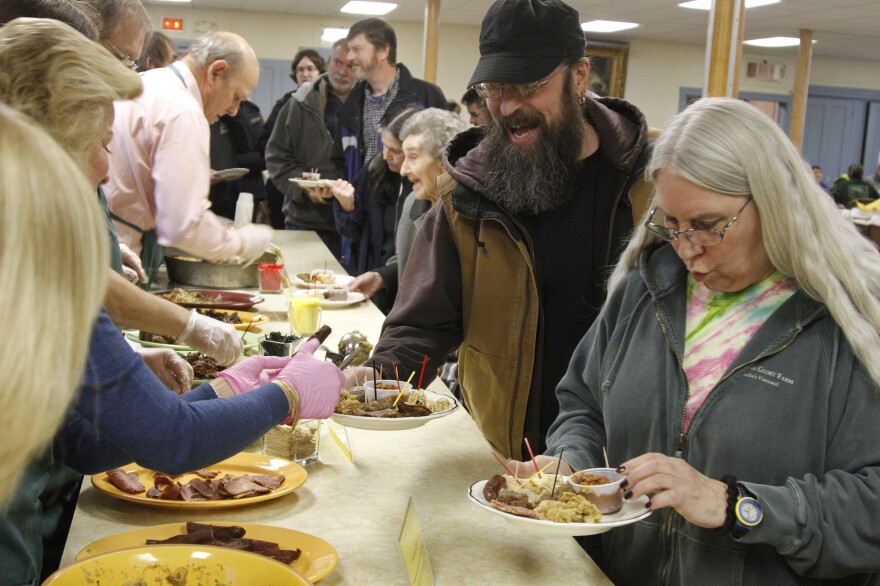The wild-game supper has traditionally been a way for rural America to share the harvest before winter sets in. Food historians trace the ritual back to Colonial times, when families had to hunt in order to eat well, and some providers were better shots than others.
In fact, you could think of Thanksgiving in Plymouth as the first neighborhood potluck. There is no written record of the menu, but historians guess that Native Americans brought the deer, and the colonists supplied the fowl, including, possibly, duck, geese and turkey.

A pretty tame menu, actually, compared with the venison, bear, moose, rabbit, pheasant, buffalo and boar served up at an annual event in Bradford, Vt., that food writer Calvin Trillin has called "the Superbowl of church suppers."
For almost 60 years, adventuresome carnivores from all over New England have lined up outside the white-steepled United Church of Christ in the center of this close-knit hamlet along the Connecticut River. A couple of decades ago, volunteers fed 1,200 people in one day, but that proved unworkable, so now seats, reserved well in advance, are capped at 800 for $25 a plate. Proceeds benefit the church's capital fund, and charity.
Dave McLam, the grandson of one of the original organizers and the current co-chairman, spends much of the fall finding and butchering enough meat for a sold-out crowd. McLam is a state transportation worker, so he sometimes scores fresh roadkill. But mostly, hunters call him when they've bagged more than they can eat.
"Or I'll make those calls to people saying, 'Well, if you hear of somebody with a bear, we need some bear meat for the game supper.' Beavers — I try to recruit the trappers to acquire beavers for us," he says.
Since hunting isn't quite as popular as it used to be, McLam has to fill in the menu with some exotica from game farms. One of those delicacies sizzles on an outdoor grill under the experienced spatula of Gary Tomlinson.
"I do the boar detail — smoked boar, roast boar and boar sausage," he explains. He's been either washing dishes or grilling at the supper for over 43 years.
The recipes have evolved over decades, says longtime volunteer Storme Odell. "They would go to old cookbooks, and they would find a recipe, and then of course, it was, 'How can we change it for 800 people?' "
When the game and the side dishes — potatoes, squash, rolls, cabbage salad, and gingerbread — are arranged in chafing dishes and platters, McLam gives the go-ahead for the first seating.
"OK, ladies and gentlemen, we're going to start with Nos. 1 through 75," he says into the pulpit microphone.
Diners of all ages, some dressed up, some in work clothes, head downstairs to a long buffet table. Smiling servers wearing official game supper aprons dish out chunks of wild game speared with color-coded toothpicks.
"Here's your venison jerky, something new, and the game stuffing," one says cheerily. "Enjoy. Thanks for coming. And here's your beaver and water buffalo."
Al Brochu, from New Hampshire, loads up his plate and heads for his assigned table. Before lifting his fork, he matches his menu card to the rainbow of toothpicks sticking out of his supper: "Beaver, green yellow, bear, moose, beaver."
He looks a little dismayed at the double serving of beaver, his least favorite. But he plans to polish off everything else. He's been making this annual 75-mile lunch run for over 20 years.

So what keeps them coming back? As she meets and greets friends and strangers, The Rev. Karen Lipinczyk says this game supper — like many others in New England — is not just about filling church coffers.
"Church folk and nonchurch folk working together to pull off this welcome to Bradford kind of event — it's just a lovely thing," she says.
"All these folks, men and women, hunt, so there's something historic. They are rooted in the land up here."
And, she notes, nervously eyeing the still-long buffet line, there's nothing quite like pheasant stew to make people thankful for the place they call home.
Copyright 2021 Vermont Public Radio. To see more, visit Vermont Public Radio. 9(MDIxMDkyNjUxMDE0NDY1Njg1NzRiOTRiYQ000))





